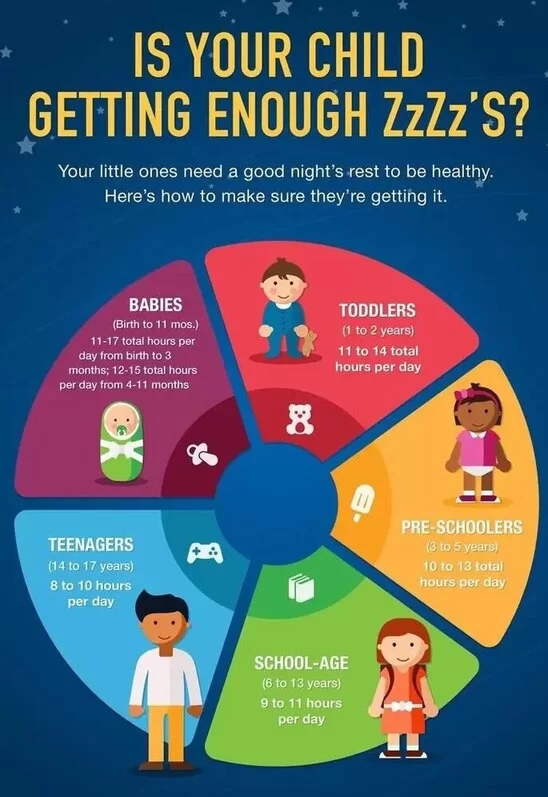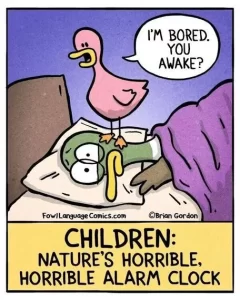
My children were always put to sleep at 7.30 p.m., and as a solo mum if I had theatre practice, they would come along in their jammys and bunk down on the floor, with a few strategically placed cushions, and go to sleep there. They knew this is what was expected of them, and because their bedtime routine was upkept there was no problems. So, I was surprised to find that there were people who might find it foreign that their children were in bed before 9.00 p.m., and indeed took umbrage at the thought that anyone would think different than them.
This led me to question were there parents out there who did not realise what the impact of not having enough sleep can have on a child. Let me elaborate.
WHAT SLEEP DEPRIVATION CAN LOOK LIKE
Quite often sleep deprivation symptoms can be overlooked and mistaken for the natural characteristics of the child, or possibly even ADHD. Some children become overstimulated and excitable others may be withdrawn, tearful or low in energy. Don’t expect cooperation with others from those overtired toddlers. Nor would I expect your school age children to be coping academically and behaviourally at school. It will also be no picnic to get them out of bed in the morning. Others will fall asleep in class or on the way home from school. Parents sometimes don’t realise it’s not normal to need a nap past the age of five.
HOW DO YOU KNOW IF YOUR CHILD IS SLEEP DEPRIVED?
Here’s an easy test. Study his behavior in the weekends, over the weekdays when he has to get up early, and note if there is a difference in behavior. Or trial earlier nights for a fortnight and see if you can note a difference.
HOW MUCH SLEEP IS ENOUGH
In General, the following is a guideline but will be variable to the particular child…
- Newborns (birth to 2 months): 10.5 – 18 hours
- Infants (3-11 months): 9-12 hoursAdolescent (age12 – 18): at least 8 1/2 hours
- Toddlers (age 1-3) 12-14 hours
- Preschoolers (age 3-5) 11-13 hours
- School age (age 5-12) 10-11 hours
- Adolescent (age 12-18) at least 81/2 hours

BUSY LIFES
Most parents these days lead busy lives, commuting, expecting to cook tea when they get home, and then also running busy schedules for their kids. They then feel guilty about not spending quality time with their children, much less put their kids to bed This inevitably puts bedtime further and further behind. But how is an overtired kid going to appreciate quality time. They will tend to be too cranky, too demanding or not listening to reason. Is it not better to say its your bedtime now, you can spend some time with daddy or mummy in the morning?
THE EMPHASIS IS ON YOU
We know kids need a certain amount of sleep so why then are we expecting kids to fit into our routines (like eating when daddy gets home), when we need to be fitting in with theirs. Heres a few ways to change. Early teatime for child. Sorry that means two teatimes, but you can always precook the night before. If daddy has to be picked up Jnr should be already in his pyjamas and bathed, then straight into bed when dad gets home. There’s nothing stopping commuting daddy from having a relaxing drink while reading a story in your child’s bed. That way both parties are winding down. Playtime will just have to wait until the weekend.
WHAT YOU NEED TO DO
YOU need to make a consistent bedtime routine – where certain activities are undertaken prior to bedtime, and bedtime occurs at a certain time.
YOU need to make time for winding down – LIMIT SCREEN TIME. No videos, no t.v. one hour prior to bedtime. Allow quiet playtime, using lego perhaps.
YOU need to plan ahead. Plan the meal for the next night, plan activities. Plan to have your child’s meal earlier than your meal with your husband. You can have your meals together in the weekends. Plan for one hour quiet time before bedtime.
YOU need to make bedtime special. Make the time for a wee cuddle time, story reading, and special one of one time. Avoid battles, offer choices.
Watch the sugary intake. It is silly to be having biscuits and sugar laden food prior to bedtime and not expect consequences.
Above all YOU need to be changing YOUR routine and prioritise the important things